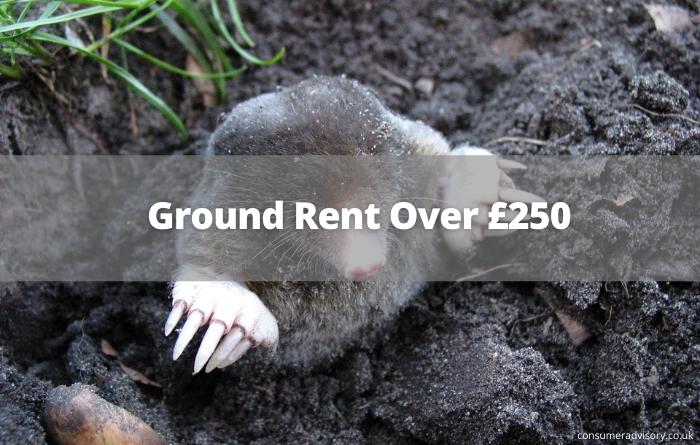
Ground rent has been causing concern among lenders and property professionals in recent years. This is because many leasehold properties, particularly flats, contain a covenant requiring the owner to pay an annual rent to their landlord or freeholder.
What is ground rent and why do landlords charge it?
These payments, known as ground rents, have traditionally been very low and have posed few problems for homeowners. However, in recent years there has been an increase in the amount being charged by landowners for these rents.
How much does ground rent cost and how is it paid?

Some ground rents are now reaching thousands of pounds per year, leading many lenders and property experts to express concerns about these burdensome payments.
Many argue that ground rent payments can place excessive financial burdens on homeowners and distort investment decisions. For example, having to pay such large sums on a regular basis may divert funds away from more important financial goals like saving for retirement or paying down other debts.
Moreover, increased ground rent obligations may make buyers less willing to purchase leasehold properties, which could lead to shortages of desirable housing on the market and drive up prices for those who do choose to become homeowners.
Therefore, it is likely that authorities will continue to investigate ground rent and look at ways to limit its negative effects on both renters and property owners alike.
What are the benefits of owning a property with ground rent and who pays for any repairs/maintenance on the property?
Ground rent is a charge levied by the landlord on the tenant for the use of the land. The amount of the annual rent will vary from lease to lease and can be a peppercorn, £1 or anything above that. The ground rent can be a fixed sum for the length of the lease, or the lease can provide for the ground rent to increase over the course of the lease.
The amount of ground rent payable and the frequency and method for increasing ground rents can all affect the value of a property and the premium payable to extend the length of the lease.
In some cases, tenants may negotiate with their landlord to have the ground rent waived entirely for a period of time, typically 10-15 years.
This can provide significant savings and may make it easier to sell or refinance the property later on.
Are there any restrictions on what you can do with your property if you have ground rent, e.g. can you let it out to tenants or sub-let part of it etc.?

When buying a leasehold property, it is essential to do your due diligence in order to ensure that you are getting the best possible deal.
One important factor to consider is the ground rent payable, as this will have an impact on both your monthly expenses and the value of your property over time.
A good place to start when assessing the ground rent is to consult with a qualified solicitor who can advise you on any relevant legal issues or requirements surrounding the lease agreement.
Additionally, it is also advisable to work with a certified surveyor who can provide expert insight into potential financial risks regarding the ground rent and how these might impact the overall value of the property.
By taking these steps, you can make an informed decision about your leasehold investment and feel confident about its future prospects.
If I own a property with ground rent, do I have to pay my landlord every year or just when I sell the property/transfer ownership of it to someone else etc.?
Ground rents that are (or will be in the future) £250 per annum or more could cause concern. The reason for this is because if you fail to pay your ground rent according to the terms of the lease, the landlord has greater powers to take possession and end lease arrangement sooner than expected – which means they get all rights imaginable under law! This type of tenancy arrangement is most likely what was experienced before when renting homes; assured tenancies were used instead so payments had priority over other things like repairs needing attention first.
Ground rent and the law
The debate around ground rent rates is a hot topic in Parliament right now. Many are calling for greater regulations and restrictions on ground rent, arguing that the current system is unfair and exploitative.
They point to leases with sky-high ground rent rates that can quickly accrue unaffordable debts, putting homeowners at risk of losing their homes or being unable to access loans for critical property repairs.
Others counter that ground rent should never be payable at all, arguing that any payment from homeowners effectively amounts to an extra tax, which only serves to line the pockets of landlords or developers. Instead, these critics call for fundamental changes to the laws underpinning leasing and ownership, so that landowners no longer have a claim over homeowners’ land or property rights.
Despite the differing opinions on this issue, it is clear that something must be done to address the growing levels of frustration and anger surrounding ground rent rates and policies.
If lawmakers do not act soon, they run the risk of further alienating both homeowners and renters alike and exacerbating tensions between various stakeholders in this hot-button debate. Whether legislators will listen to these concerns, however, remains unclear. Only time will tell which side prevails in this ongoing battle over ground rent rates.
Are there any risks associated with owning a property with ground rent – for example, could my landlord increase the amount they charge me each year without warning me in advance etc.?
There is no doubt that flat owners have a responsibility to pay their ground rent in accordance with the terms of their lease. After all, this is a basic tenant’s right and helps to ensure that rental income can be used to maintain and improve shared spaces.
However, despite this obvious advantage, many lenders remain concerned by ground rent clauses in leases due to the lack of legal protections for mortgagees. In fact, there is nothing to stop a landlord from raising the rent beyond what is fair or reasonable, leaving lenders exposed if a borrower defaults on their payments.
Although the law has yet to catch up with these concerns and offer some real protection against unfair ground rent increases, there are alternative solutions that can help to address this issue. For example, if flat owners are able to purchase the freehold in full, or at least buy out other stakeholders’ shares in it, investors are far less likely to see any negative effects from ground rents.
Similarly, letting agents can assist flat owners with drafting new leases that include provisions designed to protect against unreasonable rises in ground rent levels. With concrete actions like these, there should be no problem securing financing for flats with modern leases that effectively safeguard lenders as well as property owners themselves.
There are several ways that individuals or homeowners can work to reduce their ground rent and keep it at a manageable level. One option is to ask the landlord to vary the terms of the lease, so that the ground rent is lower.
However, it’s important to note that landlords may not be required by law to agree to such a request, and even if they do, they may charge a fee for doing so. Another option is to take advantage of the statutory powers available under certain circumstances. Specifically, home and property owners have the right under law to extend their leases and drastically reduce their ground rent in exchange for a payment known as “peppercorn rent”.
Such rights only apply after two years of ownership have passed, but they provide an effective way to limit one’s exposure to potentially unreasonable ground rents. Overall, there are several strategies that homeowners can use when dealing with ground rents, making this an issue that should definitely be addressed before purchase.
When it comes to extending the lease on your property, one of the most important factors to consider is the likely cost. A surveyor can provide you with an indication of this cost, which can run into the thousands depending on a number of factors.
However, while it may seem like a straightforward process, there are actually a number of considerations that need to be taken into account when determining the premium for extending the lease. For example, this cost is not simply stipulated by the landlord but must be determined through careful negotiation between independent surveyors who have specialized knowledge and expertise in calculating accurate premiums.
Additionally, another important consideration when attempting to extend your lease is whether or not you want a varied lease under the relevant 1993 Act. This gives you and any future buyers of your property certainty that there will be no ground rent payable throughout the entire course of the lease. In short, choosing a surveyor who understands these complexities can make all the difference when navigating this potentially expensive process. So if you’re looking to extend your lease in order to maximize your property’s value or protect yourself from unexpected costs in the long run, then consulting with a qualified and experienced surveyor should be at top of your list.
Indemnity insurance
Indemnity insurance is a type of insurance that helps protect you against certain risks or adverse outcomes. In the case of an indemnity insurance policy for a lease, this could mean protecting yourself against the risk that your landlord treats the lease as an “assured tenancy” and ends it without any protection to your lender’s security over the property.
For many landlords, taking out such an indemnity policy makes sense, as it can offer some degree of protection against potential claims from their tenants or other third parties. However, it is important to be aware that there may be certain restrictions on who can take out such policies and what they are covered for. For example, in order to qualify for coverage under an indemnity insurance policy, you may need to meet certain eligibility requirements and provide certain documentation.
Ultimately, whether or not indemnity insurance makes sense for you will depend on a wide range of factors, including your unique situation and needs as a landlord. However, by understanding the basics of how this type of policy works and knowing what to look for when evaluating your options, you can make an informed decision about whether or not it is right for you. And with the right policy in place, you can help protect yourself against certain risks and adverse outcomes that may impact your ability to manage or sell your property.
Indemnity insurance and homeowners
Indemnity insurance policies are a popular choice for homeowners who want peace of mind without having to pay a premium.
Unlike traditional policies, indemnity policies do not cover the actual cost of rebuilding your home in the event of damage or destruction. Rather, they simply guarantee that you will get back whatever value you initially paid for your home if it is ever lost due to an insured peril.
Although this might sound like a less attractive option than a more predictable and comprehensive policy, it can be a good choice for those who are looking for basic protection at a lower cost.
In addition to their affordability, one of the main advantages of indemnity insurance is that it does not require extensive underwriting or medical exams as other types of policies typically do.
This means that anyone who qualifies for mortgage financing should be able to obtain indemnity coverage relatively easily and at an affordable price. Furthermore, because indemnity policies generally expire after a set period of time rather than covering you indefinitely, they can help protect your investment without unnecessarily burdening yourself with higher monthly premiums or costly renewals over time.
While there are certainly some downsides to indemnity insurance compared to traditional options, it remains an excellent choice for many homeowners who simply want to protect their home.
